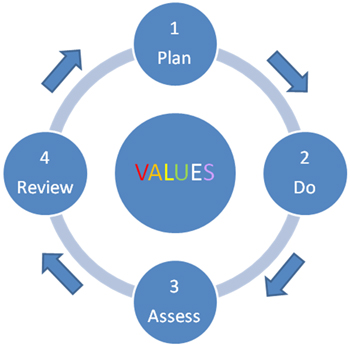It is vital therefore that every adult member of a school community, be he or she a teacher or contributing in another capacity as part of the school support team, and any adult at home, who is playing a primary part in a child’s emotional, social and cognitive development, including parents, grandparents, foster parents, step parents and extended family members, gains a clear understanding of how he or she can help to create optimal conditions that will profoundly impact children’s learning and long-term prospects in life.
A very powerful key to gaining buy-in and building such positive school/family partnerships – and one that is gaining ever more prominence - is values education. It helps to achieve a common mission – the wellbeing and full potential of each child, whatever his or her circumstances and abilities.
Growing understanding of values and their impacts
Values are principles that guide our thinking, choices and behaviour and help us to prioritise. For example, if we are addressing environmental issues and consider sustainability as important, then keeping a focus on this value we can begin to appreciate how aware people were of it in the past, the extent to which it is influencing the present and how it is shaping our vision, deliberations, assumptions, decision-making and actions for the future.
The systematic study of values promotes the integrated, holistic development of children. The experiential learning builds a bedrock of essential emotional and social competencies. Values affect every aspect of life and as children explore and put them into practise – at school and with family members at home - they are fascinated in learning about themselves and the world and how it works. They are energized and delight in a growing understanding of the relevance and impacts of values on their spiritual, physical, intellectual, emotional and social growth and progress. They feel increasingly empowered as they accumulate a wealth of knowledge and master skills that become ever more evident in changes to their attitudes, behaviour, relationships, aspirations and attainments.
Well thought through values set standards and provide sound reference points that are particularly applicable during PSHE education and Citizenship lessons. Children and young people begin to realise that they are capable of making good choices consistently, thereby continuously raising their self-esteem and confidence and improving their performance.
A unifying route to achieving complementary goals
Values education affords stimulating, practical opportunities for drawing on the strengths of teachers and parents/carers and enables them to work together to deepen children’s real-life learning across settings in which they spend the majority of their time. This collaboration helps to develop positive personal qualities, reinforce learning, enhance all participants’ skill sets and align efforts towards achieving a raft of important, complementary goals. It helps to create consistency in expectations for behaviour both at home and at school.
Research shows that the support of parents/carers is particularly conducive to children’s increased self esteem, higher rates of attendance, improved attainment and success while at school and later on in different contexts as their lives unfold. Ongoing parental involvement continues to be significant as children mature. Studies have shown that when teenagers sense a strong connection between their home and school, they are less likely to engage in high-risk behaviour. When interviewed, some adolescents, who made the right choice during the August 2011 riots in England, reported that they stayed the right side of the law because of internal, moral constraints that kicked in when faced with a critical decision in the heat of the moment.
Joint Strategy with Stakeholders: PLAN, DO, ASSESS, REVIEW

1. PLAN – Consider how best to work and communicate with all stakeholders to achieve maximum rewards from systematically embracing values education and consciously applying values to everyday life across school and home contexts.
2. DO – Encourage everyone to notice values and look out for the effects of chosen values on their own thinking, decision-making and actions and how the use and absence of values are impacting society at large.
3. ASSESS – Collate the stories and various outcomes from everyone’s joint efforts, especially in relation to children’s performance and behaviour and the quality of relationships, teaching, learning, leadership and role modelling and compare the results with your plan.
4. REVIEW – Share and communicate information about the impacts and changes being experienced so that everyone can learn from and celebrate the progress being made and use the results to go on exceeding expectations together.
To celebrate successes from time to time, you might like to utilise the facilities and apps available from “cheers” (www.chee.rs).
Having discovered some experiences that have brought a smile to many faces and made you and others happier, what about your whole school community discussing and working on a joint project for the world’s second United Nations International Day Of Happiness? It will be on Thursday, 20 March 2014 – see www.dayofhappiness.net – an innovative, enjoyable, unifying date for your school’s diary – and one to impress Ofsted inspectors as they seek evidence of school/home integration.


















